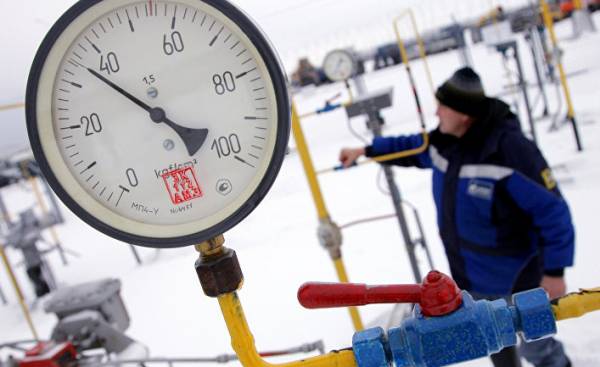
Recently it became known that Georgia is not going to make no deal about buying gas from Russia until the end of this year, and from April has shifted to the consumption of natural gas from Azerbaijan. This was stated by Minister of energy of Georgia, Deputy Prime Minister Kakha Kaladze. According to him, in January — February this year, Georgia imported from Russia 170 million cubic meters of gas, mainly due to a reduction in the supply of Azerbaijani gas. He also said that in two years, when the construction of new gas storage facilities, Georgia, in General, planning to get rid of dependence on Russian gas.
I think it’s alright. Why address this topic, how it relates to Armenia? We are talking about energy relations between Georgia and Russia. At first sight, indeed, this is true, but in reality the intention of Tbilisi to refuse from Russian gas could have far-reaching consequences for Armenia, particularly for the energy corridor North-South (Iran — Armenia — Georgia — Russia). Views of experts on this issue differ. Part of them believes that Georgia’s desire to cut the umbilical cord of gas dependence on Russia just plants the bomb in the foundations are only just emerging energy corridor Iran — Armenia — Georgia — Russia, and the other part expresses confidence that Kaladze’s statement was provided more for internal use, it does not mean that Georgia refuses from Russian gas.
When talking about the construction of energy corridor North-South, we mean a process that began after the lifting of international sanctions against Iran. We are talking about the transit of gas and electricity between Iran, Armenia, Georgia and Russia on mechanisms of barter and swapni exchanges. This was at the highest level have repeatedly said in the past year and it was discussed at the level of Minister of energy of the four countries at their meetings.
For Armenia this project is important not so much in financial terms, but also from the point of view of increasing its regional role. “Not having the necessary energy infrastructure for the transit of Iranian gas to Georgia, Armenia using the project swapni translation could become a regional energy hub. The mechanism works as follows: the part provided to Armenia Russian gas was delivered to Georgia on the Armenian-Russian gas pipeline, and Armenia would fill their deficiency due to Iranian gas,” — said the expert on energy issues Vahe Davtyan. He talks about the prospects of Armenia to become an energy hub in the past tense imperfective, as puzzled by the plans of Tbilisi. “The decision of the authorities of Georgia is not a threat to Armenia’s energy security, but it casts doubt on prospects for energy project North-South and finally isolating Armenia from regional energy projects”,- said Davtyan, adding that stopnye transfers gas could provide Armenia also some financial profit.
The volume of daily gas consumption of Georgia reach approximately 12 million cubic meters, 10 percent of which is Russian gas supplies to the rest of Azerbaijan. However, in parallel with the development of gasification in Georgia, and increase the volume of gas consumption. Consequently, according to official estimates, at the end of this year they could increase by approximately one million per day, reaching 13 million cubic meters. This means that on the day in Georgia could be delivered approximately 1-1. 5 million cubic meters of gas under the scheme swapni transfers. Not by chance in early 2016, the government of Armenia according to the special decree created the company for the transit of Iranian gas to Georgia. Director of National gas export company, Ministry of oil of Iran Ali Reza Kameli last year said that provided for the territory of Armenian export to Georgia annually about 500 million cubic meters of gas.
“Now, however, Tbilisi intends to completely abandon Russian gas, therefore, the idea of forming Svobodova energy corridor, alas, loses relevance,” — said Vahe Davtyan.
His opinion is not shared by an expert on Georgia johnny Melikyan, stressing that Kaladze’s statement on the one hand is the message intended to soothe the audience with the anti-Russian sentiment, and on the other hand, fixing the existing realities. “Georgia has already acquired from Russia a certain amount of gas, which is only slightly inferior to the amount that Georgia received in exchange for gas transit to Armenia on an annual basis. It is about 10 percent of the total volume of transit, under the old Treaty,” in conversation with us said the expert.
Georgia, according to the new contract with Gazprom in exchange for gas transit to Armenia receives gas charge in the form of money. At the same time, when signing this agreement, Russia reduced the gas price for Georgia. Therefore, now Georgia continues to purchase gas from Russia for social purposes, because during peak seasons the Azerbaijan simply can not meet the gas needs of Georgia.
According to Melikyan, Georgia have already used a social amount of gas purchased from Russia during the peak season and goes to the intake of Azerbaijani gas. Agree with him a Russian expert, Director of the national energy security Fund Konstantin Simonov, who believes that the Georgian statement refers more to the technical problem. According to him, Georgia gets Russian gas at peak use for the season. “Look, the main volume was purchased for the winter months, when demand for gas consumption was large. And now they say that before the end of the year will not enter into transactions. Normally, the peak season has passed,” said he.
About this question there is no consensus in the expert community of Georgia. One part, having underlined specific attitude to Russia sees no prospects in energy cooperation with this country and speaks of his termination. The other part, on the contrary, believes that the diversification of energy supplies is in the interests of Georgia. “In this respect, the Russian and Iranian gas represent an alternative for Georgia, and the formation of an energy corridor North-South will further increase the importance of Georgia in the region as a crossroads of energy projects,” — says Gia Khukhashvili.
On the other hand, Kaladze’s statement also aims to Pro-European and is configured to Russia, highly critical audience. “Georgia’s opposition exposes sharp criticism of the government in connection with the signing with Gazprom a new two-year contract on gas transit to Armenia. They insist that the agreement was declassified. The opposition Saakashvili’s party “United national movement” demands to form a special Commission to study the Treaty,” said johnny Melikyan, adding that this statement Georgia sends a positive signal to this layer’s internal audience, which advocated the complete termination of energy cooperation with Russia. “At the same time, according to the contract, private companies of Georgia have the right to conclude with Russian companies separate contracts on gas purchase”,- said the expert.
Most of the above experts suggests that the statement of the Georgian Minister should not be construed as an application for complete rejection of Russian gas, which can negate the efforts to create an energy corridor North — South. These are today’s realities, if not new, in the form of a regional force majeure. “Gas supply is now in no danger. Planned energy project of Iran — Armenia — Georgia — Russia will be continued, and in 2019, the parties will be able to run it,” says johnny Melikyan.







